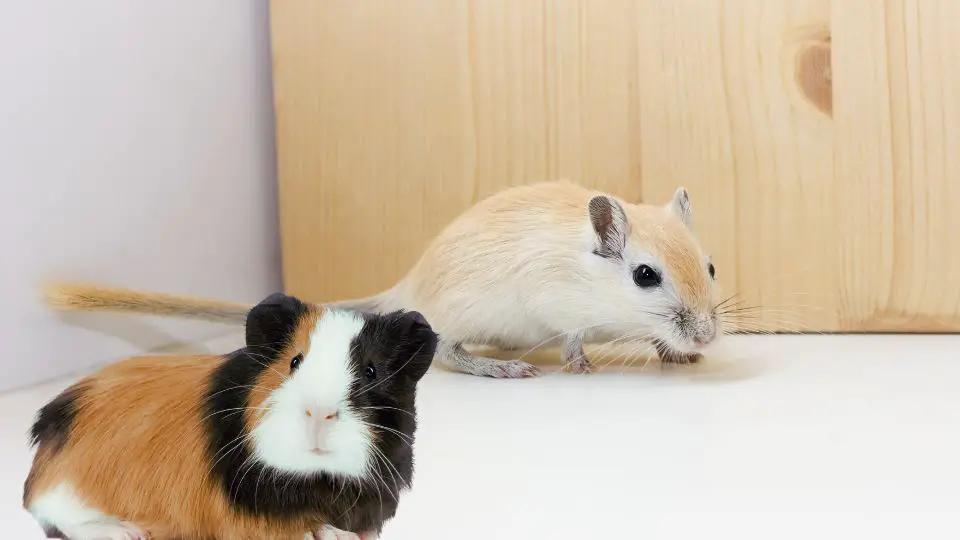Are you considering adding a new furry member to your family? Gerbils make great pets for families of all ages and sizes, but it’s important to understand the unique needs and characteristics of these small rodents before making a decision.
In this article, we’ll take a closer look at the pros and cons of keeping gerbils as pets, as well as important factors to consider before adopting. From low maintenance and affordability to short lifespans and potential nipping, we’ll help you determine if a gerbil is the right fit for your family and lifestyle.
Pros of Keeping Gerbils as Pets
Gerbils have their pros and cons and whether you’re looking for a pet to hang out with or an educational opportunity for your children, here are some reasons why gerbils should be at the top of your list.
Low Maintenance
Gerbils are relatively low maintenance pets. All they need is a little bit of food, water, and space to explore. Because they are so small, they don’t require large cages or expensive equipment like some other animals do.
They also don’t take up much room; most people can easily fit their cage in the corner of their living room or bedroom. Plus, gerbils are naturally clean animals and don’t require baths!
Affordability
Gerbils are relatively affordable pets compared to other more exotic animals. The cost of owning a gerbil is usually quite low because their cages don’t have to be as large as those of larger animals and they don’t require expensive equipment like tanks or terrariums do.
In addition, gerbils typically live between three and five years, which means that the initial investment is spread out over the life of the animal.
Educational Value for Children
Gerbils can provide an educational value for children who want to learn about animal behavior and caretaking responsibilities. Kids can observe how gerbils interact with one another in their environment and learn about how to properly care for them by providing them with food and water daily, cleaning their cages regularly, and handling them carefully.
This experience teaches kids responsibility while also giving them an opportunity to bond with another living creature.
Companionship
Finally, gerbils make great companions! They are active animals who love exploring their environment and interacting with humans (and other gerbils).
Their friendly personalities make them perfect pets who will love spending time with their owners — whether it’s cuddling up in your lap or playing together in their cage — making them a wonderful choice for anyone looking for an animal companion!
Cons of Keeping Gerbils as Pets
Gerbils are cute, inquisitive, and easy to care for—but they do come with some potential drawbacks that should be taken into consideration.
Short Lifespan
One of the biggest cons of owning a gerbil is their relatively short lifespan; most gerbils only live around two to three years. That might seem like a long time if you’re used to cats or dogs, but two to three years can go by quickly when it comes to building a relationship with your pet.
If you’re not ready to commit to the long-term responsibility of caring for a pet, then a gerbil may not be the best choice for you.
Requires A Cage
Another con of keeping gerbils is that they require an enclosure or cage—and depending on the size of your home and budget, finding space for a large enough cage can be tricky. To keep them safe and healthy, gerbils need plenty of floor space as well as room above ground level (for climbing).
You will also need to factor in costs like bedding material, food dishes, toys, and other supplies necessary for their living space.
Can Be Nippy
Although they are generally very gentle animals, gerbils have been known to bite if they feel threatened or uncomfortable. This isn’t necessarily something you should worry about too much—just use common sense when interacting with your gerbil by never picking them up suddenly or startling them in any way.
Regular handling is usually enough to get them used to human contact and prevent nipping incidents altogether.
Can Be Sensitive To Stress
Lastly, gerbils are sensitive creatures who don’t always handle change well—especially sudden changes in their environment or routine.
If you plan on having multiple pets in the same enclosure or introducing new objects into their cage frequently (like rearranging furniture), then it could lead to stress-related issues such as depression and over-grooming which can cause health problems down the line.
Factors to Consider Before Adopting a Gerbil
Adopting a pet is no small decision, especially when it comes to small animals like gerbils. Before making the leap, there are many factors to consider, including age and maturity level of children in the home, available space, allergies, and time commitment. Let’s take a closer look at each factor so that you can make an informed decision on adopting a gerbil.
Children’s Age and Maturity Level
If there are children in your home, it is important to consider their age and maturity level before bringing home a pet. Gerbils are active little creatures who love to explore their environment. They also require daily care such as cleaning their cage and providing fresh food and water.
If you have younger children in your home who lack the necessary skills or understanding of how to care for these furry friends, adopting a gerbil may not be the best choice for your family at this time.
Available Space
In addition to considering the age of your children, space is another critical factor when deciding whether or not to adopt a gerbil. Gerbils need plenty of room to run around and explore, which means that you will need enough space for them in their cage or enclosure.
If you have limited space available in your home, it might be worth waiting until circumstances change before bringing one (or more) of these little critters into your life.
Allergies
It’s also important to consider any allergies that might exist in your family before adopting a gerbil. While gerbils don’t cause as many allergic reactions as cats or dogs do, some people experience mild-to-severe allergic reactions when exposed to their fur or dander.
If anyone in your household experiences allergic reactions when around animals, it is best to schedule an appointment with an allergist prior to adoption so that they can determine if they will have any problems with owning a gerbil as a pet.
Time Commitment
Lastly, while they do not require as much attention as cats or dogs do, gerbils still need daily care and attention from their owners. This includes providing fresh food and water every day as well as cleaning out their enclosure once per week (or more often if needed).
It is important for potential owners to understand the level of commitment required before taking on the responsibility of caring for these furry friends.
Conclusion
In conclusion, adopting a gerbil is a big decision that requires careful consideration of many factors such as age and maturity level of children in the home, available space, allergies, and time commitment. By taking into account these variables and doing necessary research, potential owners can make an informed decision on whether or not to bring a gerbil into their lives.
Although they require some daily care and attention, gerbils are great pets who are sure to bring much joy to your household!







